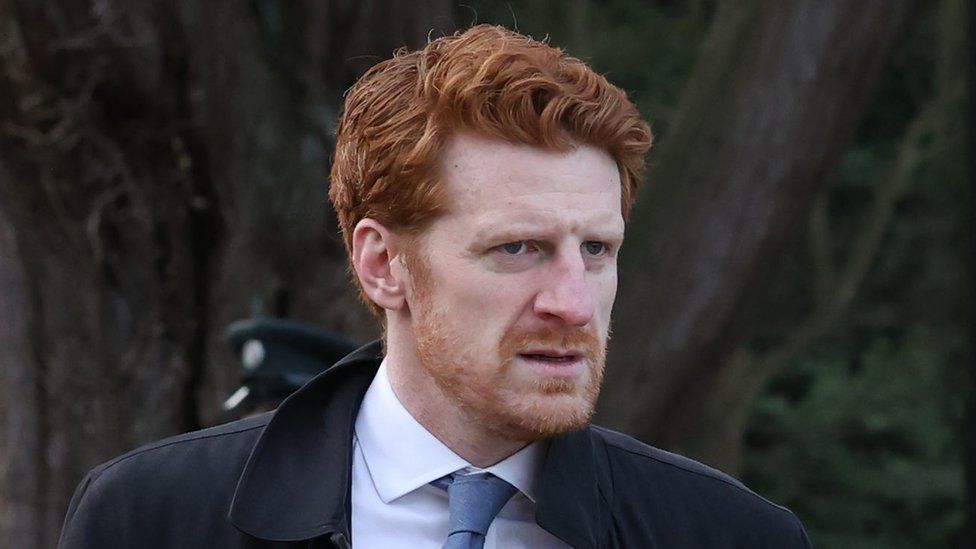
SDLP assembly member Matthew O’Toole is now the leader of the Opposition at Stormont
By Eimear Flanagan
BBC News NI
There needs to be transparency on what was agreed between the government and the Northern Ireland Executive on revenue raising, the SDLP have said.
It follows comments by First Minster Michelle O’Neill, that she had “not signed up to revenue raising” as part of a £3.3bn deal to restore devolution.
The £3.3bn Westminster package was said to be conditional on Stormont raising more income through taxes or charges.
The SDLP’s Matthew O’Toole said the public needs to know what was agreed.
The assembly member, who is the leader of the opposition at Stormont, said it was a problem if “this hasn’t been nailed down in black and white” or if it has been nailed down and people “either aren’t aware of that or are choosing not to remember it”.
“That just doesn’t, I’m afraid, inspire confidence in the public who are dealing with terrible public services and want to know what the plan is for recovering them.”
The Social Democratic and Labour Party (SDLP), the fifth largest party in the Northern Ireland Assembly, did not win enough seats to join Stormont’s coalition government, so has gone into opposition.
Mr O’Toole, who also chairs Stormont’s Finance Committee, told BBC’s Good Morning Ulster programme that he could not find any written details on the terms of the £3.3bn funding package.
Image source, SUZANNE PLUNKETT/REUTERS
The SDLP has vowed to hold Stormont’s new government to account, but has not seen formal details of the £3.3bn deal
However he did point to a letter sent to Prime Minister Rishi Sunak last week from all the executive parties, which did mention preparations for revenue raising.
“That is in black and white and that’s something that executive parties signed themselves and publicised and sent to the UK government before they met Rishi Sunak last week, so there is an in-writing commitment that they will look at it,” Mr O’Toole said.
What exactly did the letter say?
Stormont’s Executive Office released a statement on 5 February which included the “full text of the letter from executive ministers to the prime minister”.
That letter stated that officials “will now commence the process of developing a sustainability plan” which it said would include a focus on “additional funding (revenue raising and other sources)” as well as producing financial plans.
It also acknowledges that the government “has committed to writing off existing debts” on the condition that the executive “implements a plan to deliver sustainable public finances and services”.
But the parties argued: “It is our strong view that these debts exist primarily due to the underfunding of public services.”
The letter, signed by all executive ministers, described the £3.3bn deal as a “short-term solution”.
“It is clear that the current financial package, on its own, does not provide the basis for the executive to deliver sustainable public services and public finances,” it said.
Revenue raising isn’t going away you know.
Like it or not, it will be tied to £3.3bn financial package promised by the government. But we are not sure how tight the ties will be.
That is why Stormont ministers are now playing hardball ahead of the negotiations.
The executive has committed to developing a spending plan, which will include revenue raising but only if “the right level of funding is provided”.
But the government will only provide that funding if the executive lays out how it plans to raise revenue.
The Stormont version of a catch 22.
The Executive Office is jointly led by First Minister Michelle O’Neill of Sinn Féin and Deputy First Minister Emma Little-Pengelly from the Democratic Unionist Party (DUP).
Both leaders have stated in recent days that the public should not be asked to pay more for poor or declining public services in Northern Ireland.
Image source, Press Eye/Reuters
Michelle O’Neill and Emma Little-Pengelly both signalled their opposition to hiking household bills to raise money
Ms O’Neill has called for a new funding model for Northern Ireland and said she was not planning for failure in ongoing negotiations with the government.
Speaking on Good Morning Ulster, her Sinn Féin colleague John O’Dowd said: “I think everyone accepts that while £3.3bn is quite an impressive figure, on the face of it it’s not sufficient to deal with public service underfunding we’ve been facing over the last decade.”
Now Minister for Infrastructure, Mr O’Dowd added that the executive was “unanimous” in its intention to go back to the government and the Treasury to discuss “how we properly and sustainably fund the executive moving forward and those discussions are ongoing”.
Speaking to BBC’s North West Today, DUP assembly member Gary Middleton was asked if his party and others in the executive had agreed to look at revenue raising measures.
“Well no, that is not my understanding,” he replied.
“I think what all parties are calling for is a sustainable financial package from Westminster to ensure that we can pay for our public sector workers and those who have been out on strike.
“That we can pay for public services and bring them up to a standard to ensure we have the money to run Northern Ireland. That’s what we have signed up for.”








